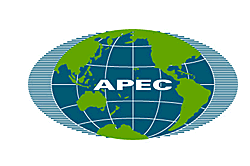

![]()


![]()
"APEC can be viewed in two ways. It can be perceived as both a trade liberalization goal, and as a variable towards an ultimate purpose. Consider the motivational factors in the following questions: Why do we pursue sustained economic growth and development? Why do we endlessly strive to improve our living and health standards? Pursuit of happiness, peace, and the betterment of oneself and humankind often influences how people act and make decisions.
Lives, organizational structures, economic relationships, and many other variables are influenced by how people strive to realize their goals. Within the multilateral cooperative initiatives of APEC, certain determinants can positively and negatively influence the outcomes and decisions made. For instance, the degree to which participants and states are willing to cooperate, their mode of thinking (short versus long-term), their willingness to compromise, and which interests dominate the political sphere, influences the outcomes and challenges within trade negotiations.
Similarly, self-interest is a central motivational factor influencing individual, state, and regional behaviour. There are many questions and challenges that must be addressed with APEC countries in order to design mutually agreeable and beneficial agreements and initiatives. For instance, should nations do what is best for their country, their bloc, or the entire world? What would provide their nation with the greatest benefit, regional or global cooperation? To what degree will states have to compromise their sovereignty for these improvements?
Will trade liberalization improve or worsen global peace and security? What significance will the absence of European countries in APEC negotiations have on goals of universal barrier-free trade? Will stable global relations and peace be questioned in the future because of Europe's non-participation in a multilateral agreement that includes Asian and North American countries?Will the benefits and sacrifices made by each country balance in the end? If not, will this lead to tensions among member states? Will anyone compensate for the any initial losses or costs incurred by the levying of trade barriers in developing nations? Who's (if any) political interest will prevail on top? Will the inequities between rich and poor be alleviated or perpetuated by trade liberalization? Will APEC ensure that development occurs sustainably, in order to preserve resources for future generations?
Or, will we forgo environmental health for the sake of short-term economic prosperity? There are many unanswered questions, and many unresolved challenges that need to be addressed to ensure the success of APEC."
(Julie Salgado, Canadian youth delegate, Trade Ministerial Meeting)
© 1997 - TG Magazine / The Students Commission
© 1997 le magazine TG / la Commission des Ètudiants